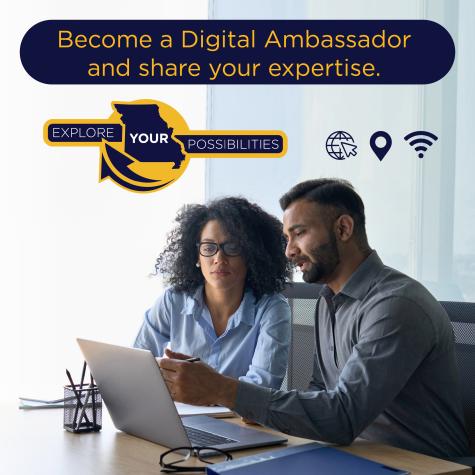Research shows that broadband access can boost a community’s economy and quality of life, but only if people take advantage of that access. A volunteer cadre of Missouri Digital Ambassadors will work with people in their communities to help them realize the benefits of broadband.
Joe Lear, a consultant for the University of Missouri System Broadband Initiative, says the goal is to turn “FUD” into “FOMO” (that’s internet-speak for “fear, uncertainty and doubt” and “fear of missing out”).
People in communities where high-speed internet access has long been limited or nonexistent may often be hesitant to dive into the online world, Lear says. They may be uncertain about how broadband will help them, have valid concerns about cybersecurity or simply not know how to get started.
“We want to create a group of local folks who can answer community members’ questions – how much bandwidth they need, how you get connected, what other things are online besides streaming and gaming applications,” he says.
Digital Ambassadors will also be able to help users clear financial hurdles to broadband access through programs that subsidize internet service or provide affordable hardware, says Noah Washburn, an MU Extension state extension and engagement specialist.
The program launches this spring with pilot projects in Kansas City and Nodaway County. To become certified Missouri Digital Ambassadors, volunteers receive 14 hours of in-person training. Working through community partners such as libraries, schools, senior centers and civic groups, Digital Ambassadors will share their knowledge – in group settings and one-on-one interactions – on a variety of topics, including telehealth, job searching online, videoconferencing, cybersecurity, social media, cloud resources and document applications such as Google Docs and Office 365.
Missouri Digital Ambassadors is based on programs such as Missouri Master Gardeners, in which gardening enthusiasts receive extensive training and share what they know with other gardeners in a variety of settings, says Washburn, who has extensive experience with peer-learning adult education programs.
You don’t have to be an information technology expert to be a Digital Ambassador, Lear says. “We are interested in people who want to learn more and assist people in their communities. IT pros are welcome, but it is not a requirement.”
Statewide sponsors include MU Extension, AT&T, MOREnet and the UM System Office of Engagement.
Those interested in participating in the Missouri Digital Ambassadors pilot programs in Kansas City and Nodaway County can go to the website, or contact Noah Washburn at nwashburn@missouri.edu or 573-882-7781.
